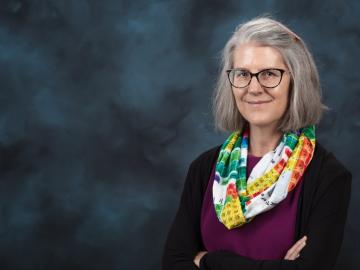
Filter News
Area of Research
News Topics
- (-) Nanotechnology (17)
- (-) Quantum Science (48)
- 3-D Printing/Advanced Manufacturing (56)
- Advanced Reactors (12)
- Artificial Intelligence (77)
- Big Data (45)
- Bioenergy (68)
- Biology (80)
- Biomedical (42)
- Biotechnology (25)
- Buildings (30)
- Chemical Sciences (35)
- Clean Water (16)
- Composites (11)
- Computer Science (111)
- Coronavirus (19)
- Critical Materials (5)
- Cybersecurity (14)
- Education (2)
- Emergency (3)
- Energy Storage (32)
- Environment (116)
- Exascale Computing (51)
- Fossil Energy (6)
- Frontier (44)
- Fusion (38)
- Grid (32)
- High-Performance Computing (81)
- Hydropower (6)
- Isotopes (33)
- ITER (4)
- Machine Learning (37)
- Materials (51)
- Materials Science (55)
- Mathematics (8)
- Mercury (7)
- Microelectronics (3)
- Microscopy (23)
- Molten Salt (2)
- National Security (60)
- Neutron Science (82)
- Nuclear Energy (66)
- Partnerships (36)
- Physics (34)
- Polymers (9)
- Quantum Computing (35)
- Security (16)
- Simulation (42)
- Software (1)
- Space Exploration (13)
- Statistics (2)
- Summit (40)
- Transportation (30)
Media Contacts

Scientists at ORNL have created a miniaturized environment to study the ecosystem around poplar tree roots for insights into plant health and soil carbon sequestration.

Travis Humble has been named director of the Quantum Science Center headquartered at ORNL. The QSC is a multi-institutional partnership that spans industry, academia and government institutions and is tasked with uncovering the full potential of quantum materials, sensors and algorithms.

A study led by researchers at ORNL could help make materials design as customizable as point-and-click.

A study by researchers at the ORNL takes a fresh look at what could become the first step toward a new generation of solar batteries.

A rapidly emerging consensus in the scientific community predicts the future will be defined by humanity’s ability to exploit the laws of quantum mechanics.

A team led by the U.S. Department of Energy’s Oak Ridge National Laboratory demonstrated the viability of a “quantum entanglement witness” capable of proving the presence of entanglement between magnetic particles, or spins, in a quantum material.

Of the $61 million recently announced by the U.S. Department of Energy for quantum information science studies, $17.5 million will fund research at DOE’s Oak Ridge National Laboratory. These projects will help build the foundation for the quantum internet, advance quantum entanglement capabilities — which involve sharing information through paired particles of light called photons — and develop next-generation quantum sensors.

Deborah Frincke, one of the nation’s preeminent computer scientists and cybersecurity experts, serves as associate laboratory director of ORNL’s National Security Science Directorate. Credit: Carlos Jones/ORNL, U.S. Dept. of Energy

At the Department of Energy’s Oak Ridge National Laboratory, scientists use artificial intelligence, or AI, to accelerate the discovery and development of materials for energy and information technologies.

Through a consortium of Department of Energy national laboratories, ORNL scientists are applying their expertise to provide solutions that enable the commercialization of emission-free hydrogen fuel cell technology for heavy-duty


